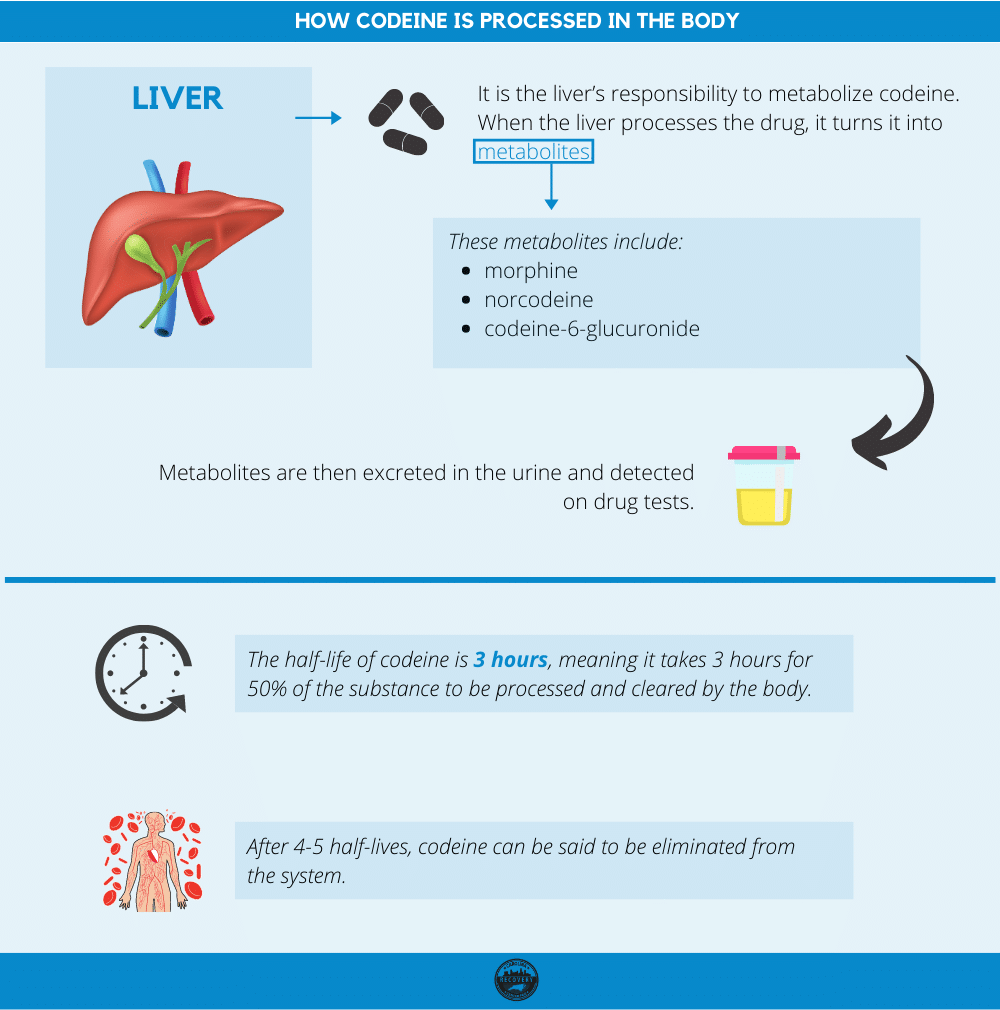How Long Does Codeine Stay in Your System?

Medically Verified: 2/1/24
Medical Reviewer
Chief Editor

All of the information on this page has been reviewed and verified by a certified addiction professional.
Codeine is a prescription opioid pain reliever that is used to alleviate mild to moderate pain and coughing. Being aware of how long codeine stays in your system can help you make informed decisions about dosing so you can reduce your risk of overdose. On the other hand, if you’re worried about passing a drug test because you’ve been abusing codeine, it may be time to consider seeking help.
What is Codeine?
Codeine is the most commonly prescribed and consumed opioid medication, placing it at the center of the opioid epidemic. As an opioid analgesic that slows down the central nervous system, this medication is approved for the treatment of mild to moderate pain, however, it is also used for off-label purposes.[1]
Some of these off-label purposes include:
- Treatment for cough and chronic cough as codeine reduces cough frequency and severity. This is usually given in a liquid form mixed with promethazine or guaifenesin and pseudoephedrine. Codeine cough syrup is often referred to as “lean” or “purple drank.” Codeine is, by far, the most abused cough suppressant.
- Treatment of restless leg syndrome when administered in the nighttime to patients who cannot find relief from other medications.
- When mixed with loperamide, codeine is used to treat persistent diarrhea.
Regardless of whether the medication comes in the form of a tablet, syrup, or injection, it is always a controlled substance. The U.S. Drug Enforcement Administration (DEA) classifies codeine as a Schedule II, III, and V drug depending on the type of medication it contains and the dose of codeine within that medication.
When taken in high doses, the drug produces euphoric effects similar to those produced by other opioids. As a result, many people abuse codeine to relax, relieve pain, or simply to get high.
People who abuse codeine run the risk of becoming addicted to it. Addiction causes trouble in nearly every area of a person’s life, between struggling to pay bills, dealing with withdrawal symptoms, and even worrying about passing drug tests. If someone is abusing codeine and has a drug test coming up, they may be wondering just how long the substance will stay in their body.
How Does the Body Process Codeine?

In order to understand exactly how long codeine stays in the system, it’s important to understand the way in which the body processes the drug and what factors determine how long this process takes.
It is the liver’s responsibility to metabolize codeine. When the liver processes the drug, it turns it into metabolites. These metabolites include morphine, norcodeine, and codeine-6-glucuronide. Metabolites are then excreted in the urine and detected on drug tests.[2]
The half-life of codeine is 3 hours, meaning it takes 3 hours for 50% of the substance to be processed and cleared by the body.[1] After 4-5 half-lives, codeine can be said to be eliminated from the system. However, drug tests don’t test for only codeine – they also test for the metabolites produced, and codeine metabolites can remain in the system for much longer.
Factors That Influence How Long Codeine Stays in Your System
While codeine has a half-life of 3 hours, there are a variety of factors that impact how long the drug stays in the system. These include:
- The dosage consumed – People who consume higher doses of codeine will require more time to process the substance. On the other hand, someone who takes a low dose may be able to pass any drug test.
- Frequency of drug use – People who use codeine more frequently than others will have excess metabolites built up in their system, thereby requiring longer for the body to fully detox itself.
- Duration of codeine use – Similar to the frequency of use, someone who has been using codeine regularly for one year will have more metabolites in their system than someone who has only been using codeine for a week. While a short-term user may be able to pass a drug test after a few days, a long-term user may need to wait longer before taking a drug test.
- Age, weight, activity level, and metabolism – People with fast metabolisms are able to process opioids at a faster rate.[3] As a result, people who are elderly, overweight, or have any condition that compromises their metabolism may take longer to clear the drug from their body.
Since each of these factors is unique to the individual, there is no way to accurately estimate how long codeine will remain in a person’s system or be detected on a drug test.
How Long Codeine Stays in Your Urine, Blood, Hair, and Saliva
It’s impossible to say exactly how long codeine stays in the system since each person is unique. In addition to the above-listed factors that determine how quickly the body processes codeine, different types of drug tests have different detection times. While hair follicle drug tests may be a codeine user’s worst nightmare, they may easily be able to pass a blood or urine test.
Here’s an estimate of how long codeine stays in the urine, blood, hair, and saliva.
Urine Tests

Studies show that approximately 90% of codeine is eliminated through the urine.[4] Urinalysis drug tests are the most common type of drug test used because they are cheap to purchase and easy to administer. A standard 12-panel urine test will detect codeine for 1-3 days after using the drug.
Blood Tests

Blood tests are rarely used because they are more costly and invasive than urine tests. They are most often used to confirm positive results from a urinalysis, however, codeine is only detected in the blood for up to 24 hours.
Hair Follicle Tests

Hair follicle drug tests have the widest detection window. Codeine will show up on a hair test for up to 3 months after last using the drug, however, it will not show up if codeine use occurred only 2-3 weeks prior to the drug test.
Saliva Tests

Saliva tests are also rarely used because they aren’t as reliable as other types of drug tests. On average, codeine stays in the saliva up to 4 days after use.
Risks of Codeine Abuse and Addiction
When used as prescribed and taken correctly, codeine is generally a safe medication. However, someone who is worried about passing a drug test because they have been abusing codeine may have a drug problem.
It isn’t always easy to spot a codeine addiction, however, there are a few key signs and symptoms to watch out for:
- Consistently appearing under the influence of opioids
- Trying to obtain multiple prescriptions from multiple doctors, also known as doctor shopping
- Experiencing opioid withdrawal when not using codeine due to the development of physical dependence
- Having a strong preoccupation and intense cravings surrounding drug use
- Developing a tolerance to codeine where a person has to increase their dose to feel the same effects
- Isolating from and lying to friends and family members about substance use and behaviors
- Showing changes in mood, behaviors, appearance, sleeping patterns, or weight
- Loss of interest in activities one once previously enjoyed
Abusing codeine can put an individual at risk of overdose. Taking more codeine than prescribed, mixing it with alcohol or other opioids, or using the medication in any way other than directed by a health professional is dangerous – even just one time.
Symptoms of a codeine overdose include:[5]
- Blue and pale colored skin and lips
- Shallow, slow, or no breathing
- Cold and clammy skin
- Confusion and dizziness
- Fatigue
- Loss of consciousness
- Low blood pressure
- Pinpoint pupils
- Muscle weakness
- Weak or no pulse
- Coma
- Death
If someone is experiencing overdose symptoms, it is imperative to seek emergency medical attention immediately.
Find Help for Codeine Addiction Today
If you or someone you know is addicted to codeine in any form, it’s time to consider seeking help from a substance abuse treatment facility. At Carolina Center for Recovery, we know that getting sober isn’t easy, but we promise to be there for you every step of the way. Whether you’re ready to take the first step towards sobriety or are simply curious about your addiction treatment options, pick up the phone and call us today.
References:

